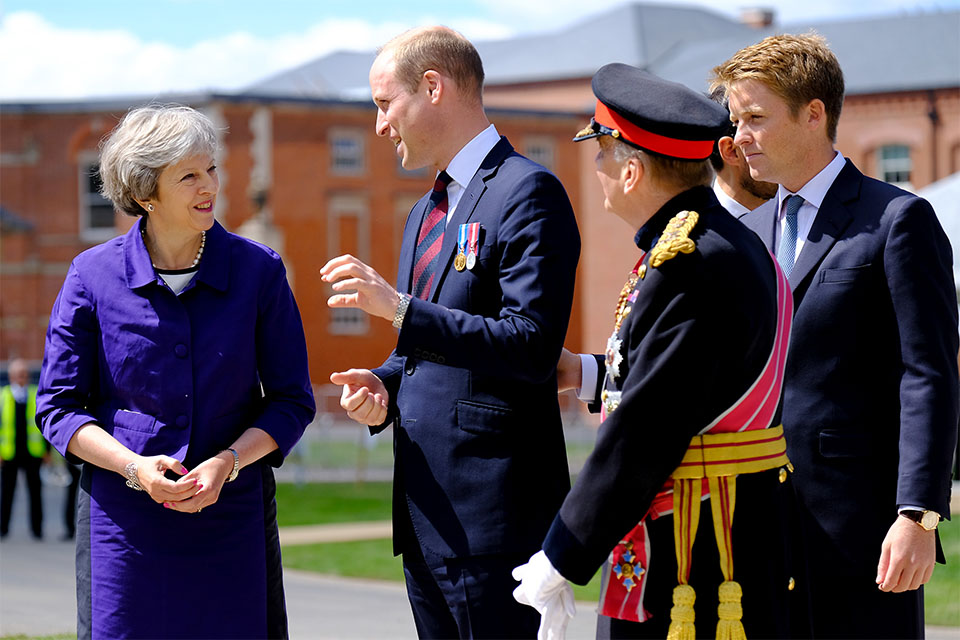PM speech at the Defence and National Rehabilitation Centre: 21 June 2018
Prime Minister Theresa May speaks the handover of the Defence and National Rehabilitation Centre.

This is a remarkable day, and – as I am sure everybody here will agree – from the spectacular sights around us, this is an extraordinary gift. On behalf of the nation, it is a great honour to accept the Defence and National Rehabilitation Centre, and I want to say a huge thank you.
You have spoken movingly about your father’s vision – and none of this would have been possible if it was not for his energy, his commitment and his determination. So I would like to thank you and your family for carrying on his initiative.
I would also like to add my thanks to the many people involved in making this happen – over a thousand people including designers, planners, architects and others – and for the very evident support of the people of the Midlands locally, at county level and in the health arena, the Nottingham University Hospital Trust.
There can be no greater gift – than giving people the chance to live their lives to the fullest – and for our most seriously injured servicemen and women, that could not be truer.
Time and again, we have our expectations overturned when they show us just what is possible, defying the odds, and inspiring us with their spirit of determination and their unwillingness to take no for an answer.
I saw that for myself most recently when I was proud to unveil the UK’s team for the Invictus Games – and I am sure all of us here would want to wish them good luck in Sydney this October.
But it is also evident in the daily triumphs as the wounded battle to overcome mental and physical hurdles – and also in the remarkable return to work rates in the military.
Every day, of every year, our Armed Forces stand ready to face grave dangers to keep us safe.
From the British sailors I met on HMS Queen Elizabeth last summer.
To the soldiers I spoke to in Baghdad before Christmas, training and supporting the Iraqi Security Forces as they fight Daesh.
To the RAF pilots and crews I met at RAF Akrotiri last year including those who carried out the long range precision strikes against chemical weapons facilities in Syria which I ordered in April.
The bravery and devotion to duty of our Armed Forces is a constant source of pride and inspiration.
And just as they face grave dangers on our behalf, so too we must do everything we possibly can when they are injured in combat, or during the course of training.
For the past 70 years, Headley Court has paved the way in first rate rehabilitative care – from the first RAF pilots it treated to the veterans of the conflicts in Afghanistan and Iraq – and it also treated those in the UK’s Invictus Team.
But today we face new threats and new dangers – and have a new generation of servicemen and women who are surviving with complex injuries.
So I am delighted that the Stanford Hall estate will provide a 21st century vision of Headley Court, and the next generation of rehabilitative care.
And I am looking forward to seeing for myself its world class facilities – particularly in the Neurological Wing.
But, of course, the vision that gave rise to the Stanford Hall Estate – was not just to do something for our servicemen and women. It was also to ensure that civilians who have experienced major trauma can also benefit from the first rate facilities here.
For decades, the military has pioneered innovations in health care: from facial reconstruction in the Second World War, to trauma treatment in more recent conflicts.
So it is absolutely right that the NHS and the Armed Forces continue working together – and that the NHS can learn from the Stanford Hall Estate’s ground-breaking work in rehabilitation, and in training the next generation of NHS medics.
That’s why the local NHS and Midlands Engine are looking at further opportunities for partnership – and the NHS is considering whether facilities at the Stanford Hall Estate could be developed to support civilian NHS services and what additional opportunities there may be in training, research and education.
All of this of course will support the vision of the NHS of the future, a vision that will see the NHS deliver a long term plan to secure its future – ensuring that everyone will receive the right care, in the right setting, at the right time – just as the Stanford Hall Estate will provide the specialised care needed for the patients who come here.
I want to wish those who will work here – and those who will find themselves treated here – the very best – may you go on to have full and rewarding lives.